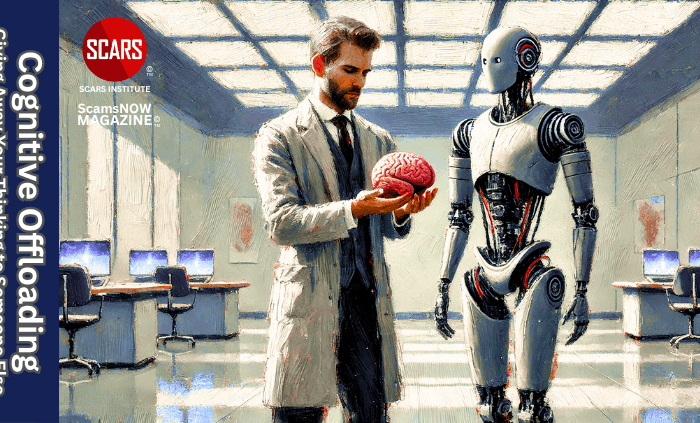Scam Victims Editing Their Stories To Promote Recovery From Scams
Scam Victims Recovery
Helping Scam Victims through their Post-Scam Transformation
Authors:
• Vianey Gonzalez B.Sc(Psych) – Licensed Psychologist Specialty in Crime Victim Trauma Therapy, Neuropsychologist, Certified Deception Professional, Psychology Advisory Panel & Director of the Society of Citizens Against Relationship Scams Inc.
• Tim McGuinness, Ph.D. – Anthropologist, Scientist, Director of the Society of Citizens Against Relationship Scams Inc.
• Based on work by Lori Gottlieb
About This Article
Victims of scams often find themselves trapped in the narratives of their past experiences, bound by feelings of betrayal and vulnerability. However, through the process of editing their stories, they can embark on a journey of recovery and transformation.
By acknowledging external factors that contributed to their victimization and reframing their narratives to include themes of resilience and growth, scam victims reclaim agency over their lives. Radical honesty serves as a cornerstone of this process, enabling victims to confront their experiences without judgment and fostering genuine connections within support networks.
Through introspection and vulnerability, victims emerge stronger and more empowered, rewriting their stories to embrace freedom and change. In this journey of personal and collective transformation, compassionate support plays a crucial role in challenging limiting narratives and unlocking the potential for growth.
The Power of Editing: How Our Stories Shape Our Lives – How Scam Victims Need To Edit Their Stories To Recover
Scam victims often need a type of intervention that offers a potent tool often overlooked: the art of narrative editing – in other cords editing your own story.
Scam Victim Stories
In the case of scams, victims often find themselves ensnared in the trap of their past experiences. The narratives they tell about their victimization serve as constant reminders of betrayal, loss, and vulnerability. Yet, these stories, while valid, can also function as shackles, binding individuals to a stagnant existence defined by victimhood.
Scam victims frequently revisit their narratives, replaying the events that led to their exploitation. These stories, though cathartic in their retelling, inadvertently perpetuate feelings of powerlessness and despair, and just as importantly can be spread to other scam victims who hear them. They serve as echoes of a traumatic past, reverberating through every aspect of the victim’s life.
This is not to say that every scam survivor does this. Those like Debby Montgomery Johnson, Sharon Armstrong, Elina Juusola, and Vianey Gonzalez, have moved past the limitations in their earlier versions of their stories and have turned them into profoundly motivating narratives.
Breaking Free
To break free from this cycle of victimization, scam victims must engage in the transformative process of narrative editing – something that is a part of the SCARS support process. This entails each scam survivor critically examining their stories, identifying entrenched thought patterns, and challenging the narratives that no longer serve them, along with coaching from their peers who have been through it.
By editing their stories, scam victims can reclaim agency over their lives and shape their futures with intentionality and purpose. They can redefine themselves not as passive victims but as empowered survivors capable of transcending their past experiences.
Narrative editing empowers scam victims to rewrite their stories from a place of strength and resilience. It allows them to cultivate a narrative of self-empowerment, resilience, and growth—one that acknowledges the pain of the past but refuses to be defined by it.
Through this process, scam victims can let go of the narratives that anchor them to their past and instead embrace a future filled with possibility and potential. They can envision new chapters in their lives, ones characterized by healing, growth, and transformation.
The SCARS Process
Breaking free from past harmful narratives is a transformative process that requires self-reflection, courage, and persistence.
By identifying and challenging the negative thought patterns and beliefs that contribute to feelings of victimization, individuals can begin to reframe their experiences in a more empowering light.
With guidance and support, they can create new narratives that emphasize agency, resilience, and hope for the future. Through visualization techniques, positive affirmations, and the cultivation of a supportive network (which SCARS provides for those who can use it,) survivors can gradually reclaim their sense of self-worth and autonomy. While the journey may be challenging, every step forward represents progress towards healing and personal growth.
Here are the process actions:
- Self-Reflection: Encourage scam victims to engage in introspection and examine the narratives they hold about their victimization.
- Identifying Harmful Patterns: Help victims recognize recurring thought patterns and beliefs that contribute to feelings of powerlessness and despair.
- Challenging Assumptions: Encourage victims to question the validity of their narratives and challenge assumptions that reinforce a sense of victimhood.
- Cognitive Restructuring: Assist victims in reframing their experiences in a more empowering light, focusing on strengths, resilience, and opportunities for growth.
- Creating New Narratives: Guide victims in crafting alternative narratives that emphasize agency, resilience, and hope for the future.
- Visualization Techniques: Encourage victims to visualize themselves as protagonists in their own stories, capable of overcoming obstacles and achieving their goals.
- Positive Affirmations: Introduce affirmations and positive self-talk to counteract negative narratives and reinforce feelings of self-worth and empowerment.
- Seeking Support: Encourage victims to seek support from trusted individuals, such as friends, family members, or mental health professionals, who can provide validation, encouragement, and guidance throughout the narrative editing process.
- Practice and Persistence: Emphasize the importance of consistency and perseverance in challenging old narratives and embracing new ones. Like any skill, narrative editing requires practice and repetition to become ingrained.
- Celebrating Progress: Celebrate victories, no matter how small, and acknowledge the courage and resilience demonstrated by victims as they work to break free from harmful narratives.
The Journey
In the journey toward recovery, the victim’s story (narrative) editing serves as a powerful tool for liberation. It enables scam victims to transcend the confines of their past and step boldly into the future they deserve. By reshaping their stories, they can reclaim ownership of their lives and chart a course toward a brighter tomorrow.
However, it also comes with a dark side too. These are the reinstatement of cognitive biases and other false beliefs that can return victims to vulnerability.
These include:
- It will Never Happen Again: This is the Availability Heuristic Bias – the tendency to judge the likelihood of something based on how easily examples come to mind. For example, we might think that plane crashes are more common than they actually are because we are more likely to remember news stories about plane crashes than news stories about other types of accidents. The most common of the post-scam cognitive biases is that once scammed victims are immune from being scammed again.
- Trauma Bias: The victim is just fine, they had some negative feelings but they do not need any help. They reject the notion that they need trauma counseling or trauma-informed care or support.
- Victim Bias: Only victims can understand how victims feel. This causes victims to gravitate to support that is run by other victims without any understanding of the psychological forces involved in the crimes themselves or the real process of recovery.
- Retrospective Framing: Retrospective framing is a cognitive bias that occurs when we interpret past events in a way that is consistent with our current beliefs or attitudes. This can lead to us misremembering or reinterpreting past events in a way that supports our current worldview. Also, see the Framing Effect.
- Self-Serving Bias: This is the tendency to take credit for our successes and deny responsibility for our failures. For example, we might think that we ended the scam because we saw the red flags when the scammer actually ended it.
- Actor-Observer Bias: This bias significantly impacts interpersonal dynamics, especially in scams and for scam victims. Victims may blame themselves or externalize responsibility, hindering their recovery. Overcoming this bias involves acknowledging external factors and fostering empathy towards oneself and others.
- See more Cognitive Biases in our catalog: Cognitive Biases Catalog 2024 (romancescamsnow.com)
Freedom and Change
Freedom and change emerge as recurring themes, intertwined in a dance of liberation and resistance.
We perceive ourselves as prisoners of circumstance, confined by self-imposed scripts. Yet, liberation lies in rewriting the narrative—acknowledging agency and embracing transformation.
Freedom and change are not just abstract concepts; they are deeply intertwined in the narratives of scam victims post-scam. Initially, victims may perceive themselves as prisoners of circumstance, trapped by the consequences of their scam experience. The narrative they tell themselves might reinforce feelings of helplessness and victimhood, leading to a sense of confinement within their own story.
However, the path to liberation begins with recognizing the power of storytelling. By acknowledging their agency and embracing the possibility of change, scam victims can rewrite their narratives. This process involves editing or revising their stories to include not only the external factors that led to their victimization but also their capacity for resilience and growth.
For example, a scam victim might initially blame themselves for falling for the scam, viewing their actions as a sign of foolishness, gullibility, naivety, or vulnerability. However, through introspection and self-reflection, they can come to understand the sophisticated tactics employed by scammers and the broader societal factors that contributed to their vulnerability. By reframing their story to include these external influences, they can reclaim their agency and empower themselves to avoid similar situations in the future.
Similarly, the theme of change emerges as scam victims navigate their recovery journey. Initially resistant to change, they may cling to familiar narratives that reinforce feelings of victimhood. However, as they confront their experiences and embrace the possibility of growth, they can rewrite their stories to include themes of resilience, courage, and self-discovery.
In essence, the process of editing or revising their stories allows scam victims to break free from the confines of their past experiences and embrace the possibility of a new narrative—one defined by empowerment, resilience, and agency. It is through this process that they can truly liberate themselves from the shackles of their scam experience and emerge stronger and more resilient than before.
Radical Honesty – A Cornerstone of the SCARS Process
To edit our stories is to embrace radical honesty—to confront narratives that no longer serve us and reimagine our lives with courage. It requires relinquishing familiar scripts and embracing vulnerability. In doing so, we reclaim authorship, charting new trajectories of growth.
Radical honesty, characterized by unfiltered truthfulness and transparency, holds significant value for victims recovering from scams. In the aftermath of a scam, individuals often grapple with feelings of shame, self-blame, and isolation. Radical honesty serves as a powerful antidote to these negative emotions, fostering a sense of authenticity, connection, and empowerment.
However, victims who are in denial or lost themselves to anger may perceive this as an attack. But in these cases, they will require more professional support to recover, so those who can be reached need to hear the truth regardless.
First and foremost, radical honesty encourages victims to confront and acknowledge their experiences without judgment or self-censorship. By openly discussing their encounters with scams, victims can shed the burden of secrecy and shame, realizing that they are not alone in their struggles. This unfiltered sharing of experiences creates a supportive environment where victims can find validation, empathy, and understanding from others who have walked similar paths.
Moreover, radical honesty enables victims to reclaim their narrative and assert their truth in the face of societal stigma and victim-blaming attitudes. By speaking candidly about their experiences, victims challenge misconceptions surrounding scam victimization and highlight the complexities involved. This transparency not only promotes awareness and education but also empowers victims to advocate for themselves and others within their communities.
Furthermore, radical honesty fosters genuine connections and builds trust within support networks. When individuals share their stories authentically, it cultivates a sense of vulnerability and mutual respect among peers. This openness paves the way for meaningful conversations, collaborative problem-solving, and collective healing. Victims find solace in knowing that they can express themselves freely and authentically without fear of judgment or rejection.
Additionally, radical honesty catalyzes personal growth and resilience. By embracing vulnerability and confronting difficult truths, victims embark on a journey of self-discovery and self-empowerment. They develop a deeper understanding of their strengths, limitations, and values, laying the foundation for meaningful change and transformation. Through radical honesty, victims cultivate resilience, compassion, and acceptance, emerging from their experiences with newfound clarity and purpose.
Radical honesty offers a transformative pathway for victims recovering from scams, enabling them to reclaim their voices, connect with others, and embark on a journey of healing and empowerment. By embracing authenticity and transparency, victims not only break free from the shackles of shame and isolation but also cultivate resilience, compassion, and hope for the future. Radical honesty is not just a tool for recovery—it is a powerful expression of courage, strength, and resilience in the face of adversity.
Summary
Editing our stories requires compassionate support—therapists, friends, and mentors who challenge assumptions and broaden perspectives. In confronting limiting narratives, we unlock the potential for personal and collective transformation.
As we navigate human experience, we are authors of our own stories. With each edit, we rewrite life’s script, embracing the freedom to chart new courses. In the crucible of uncertainty, we discover the power of narrative—to illuminate, inspire, and transform.
Please Rate This Article
Please Leave Us Your Comment
Also, tell us of any topics we might have missed.
Leave a Reply
Thank you for your comment. You may receive an email to follow up. We never share your data with marketers.
-/ 30 /-
What do you think about this?
Please share your thoughts in a comment above!
More Related Information:
- Cognitive Biases Catalog 2024 (romancescamsnow.com)
- Trauma Bias (romancescamsnow.com)
- Victim Bias (romancescamsnow.com)
- Retrospective Framing: (romancescamsnow.com)
- Self-Serving Bias: (romancescamsnow.com)
- Actor-Observer Bias: (romancescamsnow.com)
- Availability Heuristic Bias (romancescamsnow.com)
- Scam Victims Will Never Be The Same – A Harsh Truth – 2024 (scamsnow.com)
- Scam Victims Suppressing Trauma Or Avoiding Recovery And Healing 2024 (scamsnow.com)
- Actionable Steps For Scam Victims To Create Resilience & Recover After A Scam 2024 (scamsnow.com)
- Reclaiming Your Worth: A Scam Survivor’s Guide to Navigating Your Worthiness After a Scam – 2023 (scamsnow.com)
- Scam Victims And The Crossing Of The River Styx – An Interpretation Of The Recovery Process – 2023 (scamsnow.com)
- A Temporoparietal Junction (RTPJ/LTPJ) Theory Of Relationship Scams (scamsnow.com)
-/ 30 /-
What do you think about this?
Please share your thoughts in a comment above!
SCARS LINKS: AgainstScams.org RomanceScamsNOW.com ContraEstafas.org ScammerPhotos.com Anyscam.com ScamsNOW.com
reporting.AgainstScams.org support.AgainstScams.org membership.AgainstScams.org donate.AgainstScams.org shop.AgainstScams.org
youtube.AgainstScams.org linkedin.AgainstScams.org facebook.AgainstScams.org
ARTICLE RATING
TABLE OF CONTENTS
CATEGORIES
MOST POPULAR COMMENTED ARTICLES
POPULAR ARTICLES
U.S. & Canada Suicide Lifeline 988
![NavyLogo@4x-81[1]](https://scamsnow.com/wp-content/uploads/2025/04/NavyLogo@4x-811.png)
ARTICLE META
WHAT PEOPLE ARE TALKING ABOUT LATEST SITE COMMENTS
See Comments for this Article at the Bottom of the Page
on Substance Abuse Susceptibility And Scam Victims – 2024: “It is understandable how some would feel that alcohol or substance abuse would be helpful in handling their feelings after…” Jul 1, 20:36
on Scam Victims Use Work To Avoid Healing: “The last 6 years have been the most difficult of my life. The pandemic, having both parents in the hospital…” Jun 29, 18:38
on Entitlement Mentality And How Scam Victims Often Lose Their Path To Recovery – 2024: “Thank you for this discussion of entitlement. I can see from the descriptions listed that I have not felt entitlement.…” Jun 29, 18:22
on Samurai Wisdom and Rituals for Clearing the Mind After Scam Trauma – 2025 – [VIDEOS]: “A great guide on how to move forward in our recovery process with a calm mind, cleansed on an ongoing…” Jun 28, 07:34
on Delayed Gratification and Patience in Scam Victim Recovery – 2025 – [VIDEOS]: “We want to recover quickly and… we make new mistakes. How not to speed up the recovery process, how to…” Jun 28, 06:41
on The Unique Injury Of Betrayal Trauma On Scam Victims – 2024: “Primarily because you did not see it coming” Jun 27, 23:57
on Changes In A Scam Victim’s Life: “I really detest the way my trust in others has been affected by the scamming I went through. I used…” Jun 27, 14:47
on The Unique Injury Of Betrayal Trauma On Scam Victims – 2024: “Betrayal Trauma is the worst feeling ever. Why does it seem so much worse when a scammer does that to…” Jun 27, 14:34
on EMDR Therapy For Scam Victims’ Trauma – A Part Of The Recovery Process For Many – 2024: “Very comprehensive article explaining all aspects of EMDR. I’d only heard of it before and now I have a much…” Jun 26, 19:01
on Forgiving Yourself After Surviving a Romance or Investment Scam – 2025: “Thank you for this valuable article. Self-forgiveness was for me the biggest step that led to my recovery. That also…” Jun 26, 17:28
on Counseling And Your Native Language: “These points make perfect sense. I can’t imagine trying to express complex emotions in a second language. I realize many…” Jun 26, 16:05
on Thought-Terminating Cliches – How What You and Others Say Stops Critical Thinking and Recovery for Scam Victims – 2025: “I didn’t realize that these “innocent phrases” clichés ending thoughts, can have such effect / negative -inhibiting / on our…” Jun 26, 14:48
on Scam Victim Resistance In Support Groups Therapy Or Counseling Can Destroy Opportunities For Recovery – 2024: “Working with either a support group or therapist to me means a self commitment to actively participating in the therapy.…” Jun 24, 21:01
on ‘I Just Want To Forget It’ – Denial & Avoidance Are Natural But Will Not Help Scam Victims On Their Path To Recovery From Scams – 2024: “My financial loss, the shock and betrayal of the crime ending all combined to fray my nerves and spend hours…” Jun 24, 20:10
on You Hate Being Told What To Do? How Your Rebellious Mentality Can Sabotage Your Recovery – 2025: “I am a bit of a rebel, and the moment someone tells me to do something, worse, does it even…” Jun 24, 15:04
on You Hate Being Told What To Do? How Your Rebellious Mentality Can Sabotage Your Recovery – 2025: “You are very welcome” Jun 24, 03:01
on You Hate Being Told What To Do? How Your Rebellious Mentality Can Sabotage Your Recovery – 2025: “This is a great article, which makes perfect sense as to why anyone would resist the help offered to them.…” Jun 23, 20:01
on Scam Victims’ Responsibilities – 2021 [Updated 2025]: “Thank you for this article. As I continue my journey, I focus on the here and now and let the…” Jun 21, 16:26
on Scam Victims Avoid Or Escape The Aftermath Of Scams – How Denial And Distraction Avoid Confronting Reality – 2024: “In the earliest days after my crime I felt powerless, helpless and weak. I had been through so much in…” Jun 21, 14:46
Important Information for New Scam Victims
Please visit www.ScamVictimsSupport.org – a SCARS Website for New Scam Victims & Sextortion Victims
SCARS Institute now offers a free recovery program at www.SCARSeducation.org
Please visit www.ScamPsychology.org – to more fully understand the psychological concepts involved in scams and scam victim recovery
If you are looking for local trauma counselors, please visit counseling.AgainstScams.org
If you need to speak with someone now, you can dial 988 or find phone numbers for crisis hotlines all around the world here: www.opencounseling.com/suicide-hotlines
Statement About Victim Blaming
Some of our articles discuss various aspects of victims. This is both about better understanding victims (the science of victimology) and their behaviors and psychology. This helps us to educate victims/survivors about why these crimes happened and not to blame themselves, better develop recovery programs, and help victims avoid scams in the future. At times, this may sound like blaming the victim, but it does not blame scam victims; we are simply explaining the hows and whys of the experience victims have.
These articles, about the Psychology of Scams or Victim Psychology – meaning that all humans have psychological or cognitive characteristics in common that can either be exploited or work against us – help us all to understand the unique challenges victims face before, during, and after scams, fraud, or cybercrimes. These sometimes talk about some of the vulnerabilities the scammers exploit. Victims rarely have control of them or are even aware of them, until something like a scam happens, and then they can learn how their mind works and how to overcome these mechanisms.
Articles like these help victims and others understand these processes and how to help prevent them from being exploited again or to help them recover more easily by understanding their post-scam behaviors. Learn more about the Psychology of Scams at www.ScamPsychology.org
SCARS INSTITUTE RESOURCES:
If You Have Been Victimized By A Scam Or Cybercrime
♦ If you are a victim of scams, go to www.ScamVictimsSupport.org for real knowledge and help
♦ Enroll in SCARS Scam Survivor’s School now at www.SCARSeducation.org
♦ To report criminals, visit https://reporting.AgainstScams.org – we will NEVER give your data to money recovery companies like some do!
♦ Follow us and find our podcasts, webinars, and helpful videos on YouTube: https://www.youtube.com/@RomancescamsNowcom
♦ Learn about the Psychology of Scams at www.ScamPsychology.org
♦ Dig deeper into the reality of scams, fraud, and cybercrime at www.ScamsNOW.com and www.RomanceScamsNOW.com
♦ Scam Survivor’s Stories: www.ScamSurvivorStories.org
♦ For Scam Victim Advocates visit www.ScamVictimsAdvocates.org
♦ See more scammer photos on www.ScammerPhotos.com
You can also find the SCARS Institute on Facebook, Instagram, X, LinkedIn, and TruthSocial
Psychology Disclaimer:
All articles about psychology and the human brain on this website are for information & education only
The information provided in this and other SCARS articles are intended for educational and self-help purposes only and should not be construed as a substitute for professional therapy or counseling.
Note about Mindfulness: Mindfulness practices have the potential to create psychological distress for some individuals. Please consult a mental health professional or experienced meditation instructor for guidance should you encounter difficulties.
While any self-help techniques outlined herein may be beneficial for scam victims seeking to recover from their experience and move towards recovery, it is important to consult with a qualified mental health professional before initiating any course of action. Each individual’s experience and needs are unique, and what works for one person may not be suitable for another.
Additionally, any approach may not be appropriate for individuals with certain pre-existing mental health conditions or trauma histories. It is advisable to seek guidance from a licensed therapist or counselor who can provide personalized support, guidance, and treatment tailored to your specific needs.
If you are experiencing significant distress or emotional difficulties related to a scam or other traumatic event, please consult your doctor or mental health provider for appropriate care and support.
Also read our SCARS Institute Statement about Professional Care for Scam Victims – click here
If you are in crisis, feeling desperate, or in despair, please call 988 or your local crisis hotline.
More ScamsNOW.com Articles
A Question of Trust
At the SCARS Institute, we invite you to do your own research on the topics we speak about and publish. Our team investigates the subject being discussed, especially when it comes to understanding the scam victims-survivors’ experience. You can do Google searches, but in many cases, you will have to wade through scientific papers and studies. However, remember that biases and perspectives matter and influence the outcome. Regardless, we encourage you to explore these topics as thoroughly as you can for your own awareness.















![scars-institute[1]](https://scamsnow.com/wp-content/uploads/2025/04/scars-institute1.png)
![niprc1.png1_-150×1501-1[1]](https://scamsnow.com/wp-content/uploads/2025/04/niprc1.png1_-150x1501-11.webp)

Throughout my studies in this survivor school I’ve learned that I owned and used the courage to break contact with the criminals, that the crime was not my fault and while I have a financial loss that has set me back a number of years all is not lost. I did not lose everything, I still have a home, food on the table and a husband that has become my greatest supporter. And while I may not be able to go out and buy the latest fashions I have the creativity to use what I have paired with a few finds at the thrift shop and wear my creation with pride. I have learned that forgiveness is not a vulnerability but rather a strength that has opened my mind to possibility. I am not that “woman who was in a scam” I am that woman who survived my crime. And I am the woman who not only survived my crime but a woman who has become educated, who is more cautious with the online world and the woman who has regained her dignity. A woman who embraces life and all it has to offer. The crime only happened to me – it is NOT me.
I love this article! It gave me clues and recommendations to reframe my story that is very healing, yet truthful and transformative. My favorite part is “Radical Honesty”.
After learning how my scammers were able to manipulate me through my studies with SCARS it was much easier to accept the truth about my PBS experience. I now look at each day as an opportunity to put into practice from this article “envision new chapters in their lives, ones characterized by healing, growth, and transformation.”